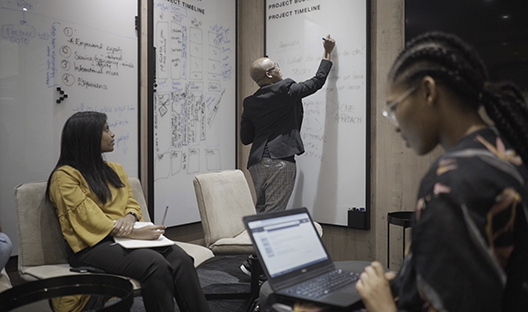Receive Focus insights straight to your inbox
Nelson Sivalingam, co-founder and CEO at HowNow, says companies that are over-dependent on in-person classroom training as a core part of their L&D strategy were stifled when the pandemic hit.
“As a result, they found themselves hacking together solutions with tools not designed for an optimal learning experience, but they did the job. Many realised their Learning Management System (LMS) was not fit for driving any learning beyond compliance because when employees had the choice, they didn’t want to use the company LMS for learning,” he said.

New norm limits valuable learning through osmosis and doing
Nelson notes that organisations were surprised by how much-unaccounted knowledge sharing and learning was informally done in an office - from shoulder tapping, and overhearing conversations to chats at the water filter. Without the right tools and culture in place, this was simply not happening remotely.
Investec’s global head of People and Organisation, Marc Kahn says, “If we look at our philosophy of learning, most of the learning that results in value creation for Investec does not come from formal learning. There is a component that does, but much of the most valuable learning in the workplace comes from doing: learning by executing the actual work through exposure to others who are doing the work with you, and the experience of doing and delivering it.”
Nelson thinks the working from home trend will necessitate a transformation in learning platforms, to fill what’s lost from spontaneous learning through in-person interaction. “This experience will shift workplace learning from top-down to social, whereby creating a space for people to learn from each other from anywhere, anytime, will become paramount.”
Upskilling and reskilling staff more crucial than ever
The pandemic has raised the urgency to upskill and retrain employees capable of thriving in a workplace dominated by automation, AI and robotics. A McKinsey report, published before the pandemic, stated that 87% of executives interviewed said they were experiencing skill gaps in their workforce due to automation and artificial intelligence.
Research from the World Economic Forum (WEF) finds that half of all employees around the world need to upskill or reskill by 2025 to embrace new responsibilities driven by automation and new technologies. That figure doesn’t include all the people currently unemployed, according to the WEF.
This has necessitated companies to evolve, by reviewing their L&D strategies in the workplace.

Pros and cons of digitised formal learning
The success of replacing traditional learning methods with online learning came as a surprise to many organisations. Institutions and businesses who’ve stuck to the long-ingrained method of classroom-based learning were pleasantly surprised by the success of courses delivered online.
Marc says, “Covid has accelerated progress in the field of formal learning. We did not imagine that content around inductions and team leader development programmes, which previously needed face-to-face engagement, would be successfully delivered digitally. But we got good results and received positive feedback."
Marc recognises that there are some cons to online learning. “People are often less ‘present,’ and there’s limited opportunity for interaction.”
But he says the upside is significant, namely scalability and no geographical location limits. “Now that digital learning is the dominant form of interaction, we've seen the ability to learn in clusters that are much broader than our geographical location. People no longer need to travel to London or Johannesburg,” he says.
Given these pros, it would be difficult to imagine learning ever returning to pre-Covid models.

We've created global learning opportunities, with access to leaders from both north and south, to groups of staff who would previously have had only local experience and exposure. Digital learning also means Investec has the opportunity to easilly draw in experts from outside of our business.
Satisfying the hunger for more online learning
Marc also observed an increase in the number of employees interested in online learning during the Covid pandemic.
Marc’s observation is confirmed by a PWC report - Hopes and Fears 2021, which found that 40% of workers say their digital skills have been improved through the prolonged period of lockdown, and claim they'll continue to embrace digital training and skills’ development.
Digital skills development amongst South African white-collar workers
37%
94%
Learning of the future is self-directed
Marc points out that the evolution of learning supports one of Investec’s key principles of being ‘self-directed’..
“At Investec, you’ve not spoonfed everything you need. He says a top-down approach is parental and not adult-to-adult. Its model is something from the last century. People want to be able to choose what they want to learn, and they are best suited to know what they most need in order to upskill, and they also want to learn at their own pace. This is the type of learning we are trying to inculcate at Investec,” says Marc.
Retaining talent depends on effective workplace learning
Marc and Nelson agree that workplace learning has moved from a ‘nice-to-have’ to a ‘must-have’ for many organisations.

Skills have become the currency of work and the fight for talent has become fierce. Companies will need to shift their talent strategy to focus on building rather than ‘buying and borrowing.
“If organisations want to outlearn their competition and thrive, L&D will need to have a seat at the executive table. Covid-19 has already prompted this shift in many organisations,” says Nelson.
Marc says one of the most important factors in retaining talent is continual learning. “Employees won’t leave an organisation if they feel that they’re learning, there’s career growth, and they have a decent relationship with their direct leader.
As a CEO of a 21st-century company you should be madly focused on whether your people are learning - and leadership. It’s not about money. Salaries must be market-related but more important than money is learning. That’s why investing in lifelong learning is so important for personal happiness, and an organisation’s success.”




